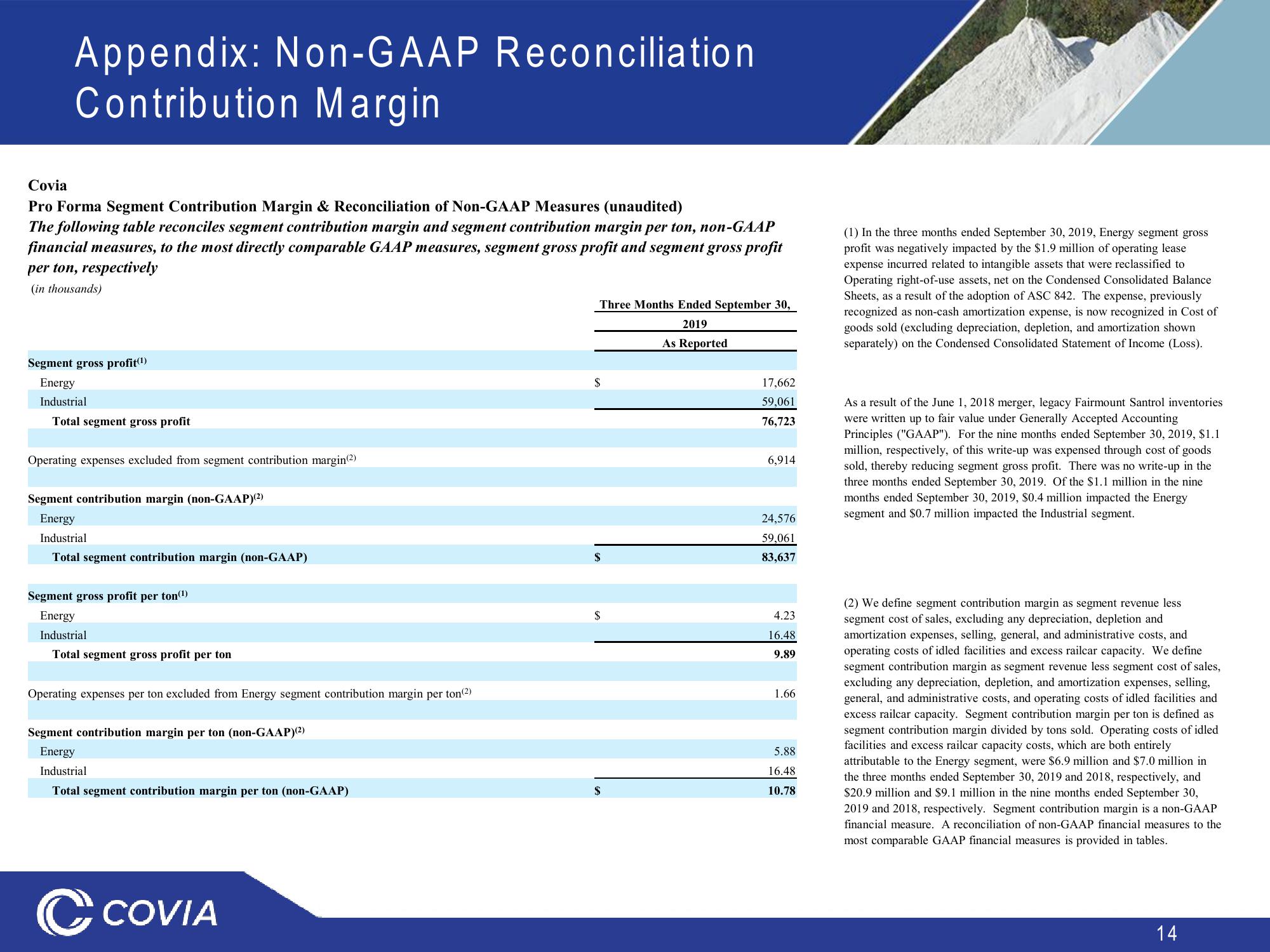Covia Investor Presentation
Appendix: Non-GAAP Reconciliation
Contribution Margin
Covia
Pro Forma Segment Contribution Margin & Reconciliation of Non-GAAP Measures (unaudited)
The following table reconciles segment contribution margin and segment contribution margin per ton, non-GAAP
financial measures, to the most directly comparable GAAP measures, segment gross profit and segment gross profit
per ton, respectively
(in thousands)
Segment gross profit(¹)
Energy
Industrial
Total segment gross profit
Operating expenses excluded from segment contribution margin(2)
Segment contribution margin (non-GAAP) (2)
Energy
Industrial
Total segment contribution margin (non-GAAP)
Segment gross profit per ton(¹)
Energy
Industrial
Total segment gross profit per ton
Operating expenses per ton excluded from Energy segment contribution margin per ton(2)
Segment contribution margin per ton (non-GAAP)(²)
Energy
Industrial
Total segment contribution margin per ton (non-GAAP)
C COVIA
Three Months Ended September 30,
2019
As Reported
$
S
$
S
17,662
59,061
76,723
6,914
24,576
59,061
83,637
4.23
16.48
9.89
1.66
5.88
16.48
10.78
(1) In the three months ended September 30, 2019, Energy segment gross
profit was negatively impacted by the $1.9 million of operating lease
expense incurred related to intangible assets that were reclassified to
Operating right-of-use assets, net on the Condensed Consolidated Balance
Sheets, as a result of the adoption of ASC 842. The expense, previously
recognized as non-cash amortization expense, is now recognized in Cost of
goods sold (excluding depreciation, depletion, and amortization shown
separately) on the Condensed Consolidated Statement of Income (Loss).
As a result of the June 1, 2018 merger, legacy Fairmount Santrol inventories
were written up to fair value under Generally Accepted Accounting
Principles ("GAAP"). For the nine months ended September 30, 2019, $1.1
million, respectively, of this write-up was expensed through cost of goods
sold, thereby reducing segment gross profit. There was no write-up in the
three months ended September 30, 2019. Of the $1.1 million in the nine
months ended September 30, 2019, $0.4 million impacted the Energy
segment and $0.7 million impacted the Industrial segment.
(2) We define segment contribution margin as segment revenue less
segment cost of sales, excluding any depreciation, depletion and
amortization expenses, selling, general, and administrative costs, and
operating costs of idled facilities and excess railcar capacity. We define
segment contribution margin as segment revenue less segment cost of sales,
excluding any depreciation, depletion, and amortization expenses, selling,
general, and administrative costs, and operating costs of idled facilities and
excess railcar capacity. Segment contribution margin per ton is defined as
segment contribution margin divided by tons sold. Operating costs of idled
facilities and excess railcar capacity costs, which are both entirely
attributable to the Energy segment, were $6.9 million and $7.0 million in
the three months ended September 30, 2019 and 2018, respectively, and
$20.9 million and $9.1 million in the nine months ended September 30,
2019 and 2018, respectively. Segment contribution margin is a non-GAAP
financial measure. A reconciliation of non-GAAP financial measures to the
most comparable GAAP financial measures is provided in tables.
14View entire presentation